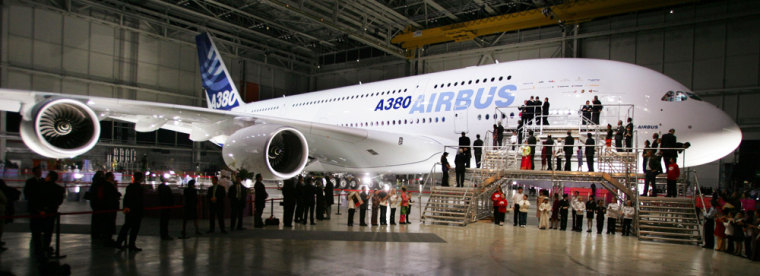Airbus put its stamp on aviation history Tuesday, unveiling the world's largest commercial jet and raising the stakes in its 35-year rivalry with Boeing Co.
The A380 "superjumbo," revealed at a lavish ceremony, gives the European plane maker a new flagship and completes its range of jets at a time when Boeing is losing market share and closing down some production.
French President Jacques Chirac and other European leaders struck a triumphal note, hailing the A380 as a sign of Europe's capacity to generate world-beating industries.
"It's a symbol of economic strength, technological innovation, the dedication of the work force that built it and above all of a confidence that we can compete and win in the global market," British Prime Minister Tony Blair said.
But the A380 remains a $13 billion bet on a particular vision of global aviation, in which carriers need ever-bigger planes to process a growing numbers of passengers through the busiest airports, which serve as hubs between connecting flights.
If Airbus is right, the A380 could consign the 747 to history, deal a further blow to Boeing and leave Airbus with a monopoly in a lucrative and fast-growing market. Boeing would need 10 years or more to develop a rival to the A380, industry experts say.
If Airbus is wrong, however, then its lead over Boeing could prove short-lived. Boeing sees a different future, one in which industry deregulation and smaller, long-range planes like its planned 7E7 allow passengers increasingly to fly direct, spurning stopovers.
New orders for 747s are on the decline, dropping from 35 in 1999 to 10 in 2004. Boeing still must deliver another 32 747s, according to the company's Web site. It has no orders for the aircraft so far this year.
Airbus says falling sales of the 747 — Boeing delivered 15 last year — is a sign that the A380 is going to replace the jumbo.
In a three-class cabin layout, the A380 will carry 555 passengers — 33 percent more than the 747. On a full tank, it will carry passengers 5 percent farther than Boeing's longest-range jumbo, Airbus claims, producing costs per passenger that are up to one-fifth below its rival's.
Fred Smith, CEO of FedEx Corp., which has ordered 10 of the A380's freighter version, said the plane and its 150-metric ton payload would have "very far-reaching effects on the efficiency of world trade" and boost FedEx's network between the United States, Asia and Europe. Rival UPS Inc. has also ordered 10 superjumbos.
Analysts essentially described the A380 as a niche aircraft and said there will likely be strong demand for it and Boeing's smaller 747 and 777 going forward.
"At this point, Airbus hasn't demonstrated that the market is as big as they were hoping," said Michael Allen of Back Aviation Solutions, a consulting firm based in Connecticut.
Airbus already has 149 orders for the $280 million plane but needs 100 more to break even, and a further 500 before it can deliver on its pledge of a 20 percent return on investment.
Meeting the sales target would generate revenue of 150 million euros, Airbus CEO Noel Forgeard said in a newspaper interview published Monday, or $200 million per plane.
"At the end of the day, the A380 will be a very successful airplane," said Jon Ash, president of InterVISTAS-ga2, a Washington-based aviation consulting firm.
However, Ash believes the A380's success would not necessarily be the end of the road for the 747. The superjumbo will be an attractive bet for carriers on long-haul, high-density markets, he said, whereas the 747 could remain a "viable alternative" for others.
"The 747 is going to have the middle market, for those carriers that don't believe they can generate the kinds of volumes that are necessary for the A380, or where their route structure is not constrained by congestion," he said.
But Boeing is hedging its bets. It announced plans last year for a larger, 450-seat 747, despite having dismissed the case for a bigger plane since Airbus began discussing the concept in 1991. A launch decision is expected in mid-2005.
Boeing and Airbus also have been in a long dispute over government subsidies. The United States and the European Union agreed last week to try to amicably settle the matter. Both sides committed for three months, while talks continue, to stop subsidizing the world's two biggest aircraft makers.
"Airbus claims to be profitable and claims to be the world commercial aircraft leader. With that type of success, it doesn't need subsidies," Boeing spokesman Dick Dalton said.
The weak dollar also could come to Boeing's aid. Most of Airbus' costs are in euros, and the plane maker said last week it has been forced to raise its dollar-denominated prices to cope.
Lehman Brothers analyst Joseph Campbell predicted in a report that the dollar's slide, combined with a U.S. airline recovery, would halt Boeing's loss of market share.
Nonetheless, Chicago-based Boeing is looking more fragile after it said Friday it was to end production of its 106-seater 717 and announced a $615 million charge. About half the writedown was made to cover the cost of losing a $23 billion Pentagon contract for mid-air refueling tankers as a result of a corruption scandal.
Airbus is now well positioned to pick up at least some of that work, and the loss of the contract raises doubts over whether production of the 767 can continue until the arrival of its successor, the 7E7, in 2008.
Airbus plans the first test flight of the A380 sometime before March 31.
